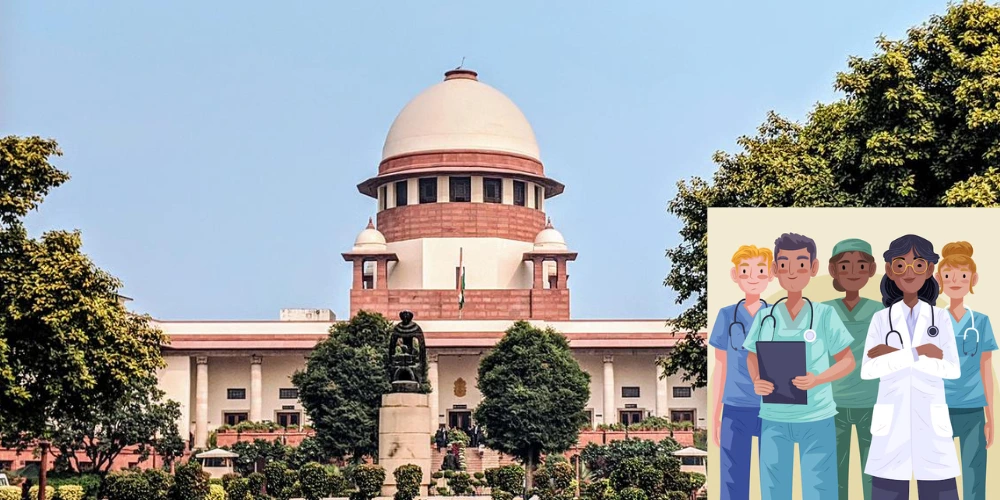August 29, 2025 | New Delhi
The Supreme Court on Friday agreed to examine a significant public interest litigation (PIL) concerning the denial of free medical treatment to patients belonging to the Economically Weaker Section (EWS) and Below Poverty Line (BPL) categories by private hospitals that were allotted government land or received government concessions on the express condition of providing such free aid.
A bench headed by Chief Justice of India (CJI) BR Gavai and also comprising Justices NV Anjaria and Alok Aradhe issued notice to the Union of India, all States and Union Territories on the plea.
The PIL has been filed by Sandeep Pandey, a Magsaysay Award-winning social activist known nationally for his work in the field of education, health rights, and transparency in governance.
According to the petition, private hospitals in multiple states—including Delhi, Maharashtra, Haryana, Odisha, Telangana, and West Bengal—were granted prime government land at concessional or token lease rates, or additional Floor Space Index (FSI) under state development control regulations, on the condition that they reserve a stipulated percentage of beds and outpatient services for EWS/BPL patients.
Typically, the obligations included 10% of inpatient beds and 25% of outpatient consultations free of charge. However, successive audit reports, court-monitored inquiries, and official inspections have exposed rampant non-compliance and failure by the authorities to monitor these obligations.
In Delhi, hospitals like Indraprastha Apollo and others were required to reserve one-third of their beds for free treatment. Repeated defaults led to the landmark judgment in Social Jurist v. GNCTD (2007) where the Delhi High Court directed strict penalties against defaulters, later upheld by the Supreme Court. Despite this, complaints of denial to poor patients continue to surface.
In Maharashtra, the 2016 CAG Report exposed that premier hospitals, despite availing additional FSI benefits, were offering only half of the mandated free services. The report also highlighted diversion of funds earmarked for indigent patient welfare, undermining the spirit of the policy.
Similarly, in Haryana, a 2018 legislative committee report revealed shocking data—one private hospital treated only 118 EWS patients free of cost out of 64,000 admissions in 2017. Worse, no monitoring meeting was held for nearly a decade.
In Odisha, the 2013–14 CAG Report flagged hospitals which had received land worth nearly ₹45.68 crore at concessional rates but failed to provide the required free services. Six promoters even diverted hospital land to build residential and commercial complexes, violating lease conditions.
The petitioner argues that these examples highlight a nationwide failure of governance, monitoring, and enforcement mechanisms which has resulted in large-scale denial of healthcare benefits promised to the poor.
The petition prays for the following directions:
1. Uniform enforcement of lease/policy conditions across all States/UTs requiring hospitals to provide free medical care to EWS/BPL patients.
2. Constitution of empowered monitoring authorities in each State/UT with powers to audit compliance and publish periodic reports.
3. Recovery of monetary value equivalent to the denied free treatment, and cancellation/resumption of land allotments in cases of persistent violations.
4. Creation of a centralized digital dashboard for real-time public display of free bed availability and compliance data.
5. Strict directions against segregation or differential treatment of EWS patients within hospitals.
6. Any other directions to ensure that public resources are not abused and healthcare rights of the poor are protected.
The PIL also underlines that failure to enforce these obligations not only deprives the poor of their right to healthcare under Article 21 (Right to Life) but also amounts to a breach of public trust since valuable government land and concessions have been granted to these hospitals.
During the hearing, Senior Advocate Sanjay Parikh appeared on behalf of the petitioner along with AOR Shahshank Singh. The Court, after hearing initial submissions, issued notice to the Union, States, and UTs, directing them to respond.
The petition also drew the Court’s attention to its related proceedings where the apex court had recently asked the Union and Delhi Governments to inquire if Indraprastha Apollo Hospital had provided free treatment to EWS patients in the last five years.
Case Details
Case Title: Sandeep Pandey v. Union of India
Writ Petition (Civil) No. 808 of 2025
